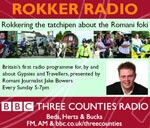Common wavelength

Europe’s 12 million Romany citizens possess no state and little territory, but are buried under a mountain of misunderstanding. With no land to call our own, Gypsy territory is always highly prized, if often bitterly contested.
So when the BBC gave Britain’s 300,000 Gypsies and Travellers our own programme called Rokker Radio (meaning Talk Radio in Romany) in April 2006, the opportunity was seized with a passion. As it’s creator and presenter, it was a relief to finally have a chance to tell all of our story.
From legal battles over horse fairs and Gypsy homelessness, to the emergence of Gypsy jazz, rap and punk, the programme gave a unique perspective on the culture we contribute, as well as the conflicts we are involved in. By providing a voice for us, the BBC ended the absolute inequality Gypsies and Traveller have long experienced in broadcasting. But like so many chapters in Gypsy history, it proved to be a false dawn.
In December 2008, Rokker Radio was broadcast for the last time. After failing to attract the support within the BBC to expand the programme from an eastern regional programme into a national voice, the project was canned. Apart from the ten episodes of an excellent Gypsy-led soap opera to be broadcast on the same local stations this year, Gypsy and Traveller broadcasting in Britain is now effectively dead. Our community is the same size as the Bangladeshi community and contributes almost £42 million in licence fees to the BBC, yet we now receive no service created by, for and about us. I don’t know of a single BBC employee from the Gypsy and Traveller community.
But if representation within the BBC is dreadful, how is representation on it? For each decent exploration of Gypsy stereotypes in drama, such as a recent edition of Waterloo Road, there much that is embarrassing. In March, an episode of Ashes to Ashes could do was argue that a den of criminal Gypsies shouldn’t be evicted because they were only “Gypoes” and not “argies”. It’s been decades since the BBC produced anything as considered as the Travelling People radio ballad or the Man Alive documentary They Steal Children Don’t They?
But perhaps the BBC’s greatest failure is not what it does produce, but what it doesn’t. This month is the second Gypsy, Roma and Traveller History Month. There will undoubtedly be some good coverage on local BBC radio and TV, but there will be none of the effort that marked Black History Month, the abolition of slavery or the partition of India. In broadcasting, it seems that some minorities are still far more equal than others.
Research from the Welsh Equality and Human Rights Commission provides a vision of what true equality for Gypsies within BBC broadcasting would look like. In 2006/07 the BBC spent £30.2 million on TV and Radio for the 457,946 people who speak Welsh in Wales, compared to the £52,000 it spent on Britain’s 300,000 Gypsies and Travellers. A similar commitment from the BBC to the Gypsy community would mean spending over £19 million pounds. That might not quite buy Gypsies and Travellers a country, but it would finally deliver us a voice.